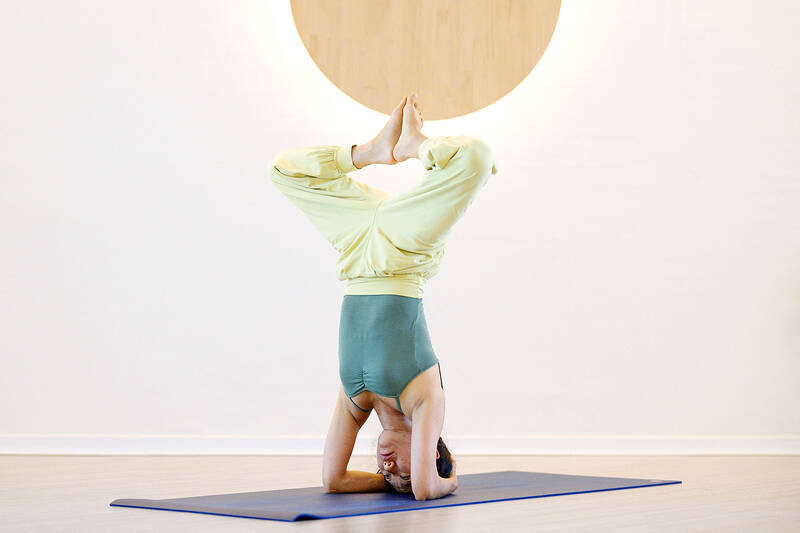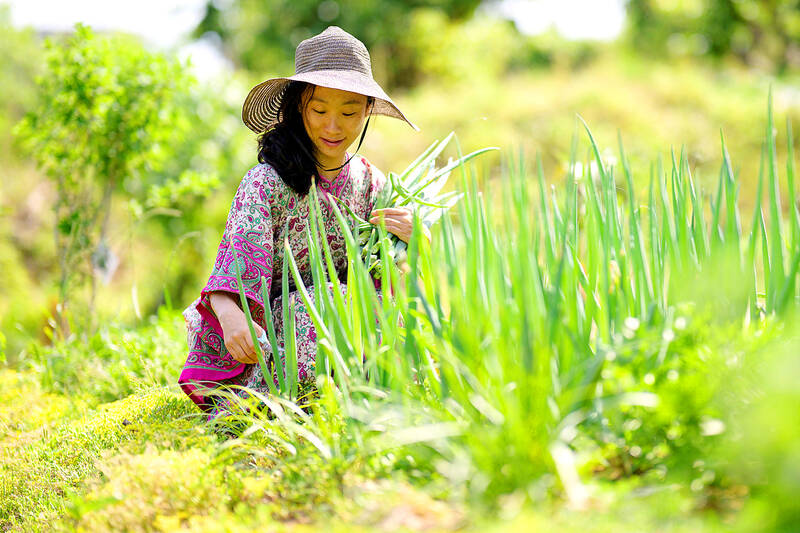South Korea has declared its super-low birthrate a “national emergency” and poured billions into encouraging citizens to marry and reproduce, but one YouTuber has found happiness and success promoting the opposite ideal.
At her home in rural South Korea, Seen Aromi practices yoga, sleeps in as long as she wants and encourages her more than 200,000 YouTube followers to not feel afraid, ashamed or guilty about being single.
“Not getting married is my greatest achievement,” said 37-year-old Seen, adding that she had never seen becoming a “good” wife or mother as the ultimate purpose of her life.

Photo: AFP
“They say it’s a ‘disaster’” that women are not having children in South Korea, she said, referring to official concern over the looming demographic crisis in the country, which has the world’s lowest birth rate and a rapidly aging population.
“But when I think about the potential downsides of not having children, (for me) there is nothing,” she said.
Seen wrote about the joy she found in opting out of society’s expectations and embracing solo living, and her book — I Can’t Help but Live Well On My Own — has become a surprise hit.

Photo: AFP
It briefly topped a major bestseller chart in South Korea, with an enthusiastic response not only from other single women in their 30s, but also from an older generation, including people who had been widowed or divorced.
She enthused in the book about having “the freedom to be as lazy as I want” and not being criticized for it.
“While some people might marry because they dislike being alone, others choose not to meet anyone simply because they enjoy lying around,” she wrote.
TRADITIONAL TRAPPINGS
Experts have suggested that many young Koreans opt out of marriage and child-rearing at least in part for economic reasons, pointing to stagnant growth, sky-high home prices in the capital Seoul, and intense competition for well-paying jobs.
Others say broader cultural issues are at play. The country remains socially conservative, single parenthood is frowned upon, same-sex marriage is not recognized and married women often end up leaving the workforce — data shows they spend 3.5 times more hours a day on household chores and childcare than male spouses.
“Traditionally defined gender role expectations in the family domain as well as tension between genders are definitely related to the current low birthrate,” said Hyeyoung Woo, a sociology professor at Portland State University.
For Seen, letting go of the traditional South Korean trappings of success — a Seoul apartment, a high-paying job, a loving spouse — has allowed her to find genuine happiness.
“I’ve never worked for a big conglomerate, do not live in the city, and never been married,” she said.
Her life in Seoul was miserable, Seen said, as she had to suffer through an exhausting commute and a stressful, abusive workplace.
After living overseas for years, working random jobs from hotel housekeeper to packing meat in a chicken factory, and posting videos about her life online, she returned to South Korea and settled in a rural town.
She renovated an old family house that used to belong to her late grandfather and her YouTube channel grew in popularity, eventually picking up more than 200,000 subscribers for her posts, which deal with everything from living alone to traveling, fitness and yoga.
A single YouTube video now earns her five times more than she used to get monthly as a salaried worker in Seoul, and she can “live a much more autonomous life — which is extremely satisfying,” she said.
BACKLASH
Her social media posts about her joyful single life have attracted backlash online, with critics claiming that in reality, Seen must be lonely, or calling her “selfish” for not getting married.
“Married people often post photos of their children and share happy images of their married life, and no one really criticizes that,” Seen said.
“But when I said I was happy, (some people) strongly denied it. They seemed to think ‘there’s no way that could be true’.”
Seen said she had been in several fulfilling relationships, but her autonomy and adventurous lifestyle are her top priority, over starting a family.
The fact that her book has become a runaway success proves that you “can still be the best at something even though you live a non-mainstream life,” she said.
Most couples who have children do it because it will make them happy, not out of concern for humanity’s future — and people who live alone have also made choices aimed at happiness, which should be respected, she said.
Seen said that she was proud of her contributions to the world.
While others were having children, she said, “I gave birth to two YouTube channels and a book.”

Taiwan Power Co (Taipower, 台電) and the New Taipei City Government in May last year agreed to allow the activation of a spent fuel storage facility for the Jinshan Nuclear Power Plant in Shihmen District (石門). The deal ended eleven years of legal wrangling. According to the Taipower announcement, the city government engaged in repeated delays, failing to approve water and soil conservation plans. Taipower said at the time that plans for another dry storage facility for the Guosheng Nuclear Power Plant in New Taipei City’s Wanli District (萬里) remained stuck in legal limbo. Later that year an agreement was reached

What does the Taiwan People’s Party (TPP) in the Huang Kuo-chang (黃國昌) era stand for? What sets it apart from their allies, the Chinese Nationalist Party (KMT)? With some shifts in tone and emphasis, the KMT’s stances have not changed significantly since the late 2000s and the era of former president Ma Ying-jeou (馬英九). The Democratic Progressive Party’s (DPP) current platform formed in the mid-2010s under the guidance of Tsai Ing-wen (蔡英文), and current President William Lai (賴清德) campaigned on continuity. Though their ideological stances may be a bit stale, they have the advantage of being broadly understood by the voters.

In a high-rise office building in Taipei’s government district, the primary agency for maintaining links to Thailand’s 108 Yunnan villages — which are home to a population of around 200,000 descendants of the Chinese Nationalist Party (KMT) armies stranded in Thailand following the Chinese Civil War — is the Overseas Community Affairs Council (OCAC). Established in China in 1926, the OCAC was born of a mandate to support Chinese education, culture and economic development in far flung Chinese diaspora communities, which, especially in southeast Asia, had underwritten the military insurgencies against the Qing Dynasty that led to the founding of

Artifacts found at archeological sites in France and Spain along the Bay of Biscay shoreline show that humans have been crafting tools from whale bones since more than 20,000 years ago, illustrating anew the resourcefulness of prehistoric people. The tools, primarily hunting implements such as projectile points, were fashioned from the bones of at least five species of large whales, the researchers said. Bones from sperm whales were the most abundant, followed by fin whales, gray whales, right or bowhead whales — two species indistinguishable with the analytical method used in the study — and blue whales. With seafaring capabilities by humans